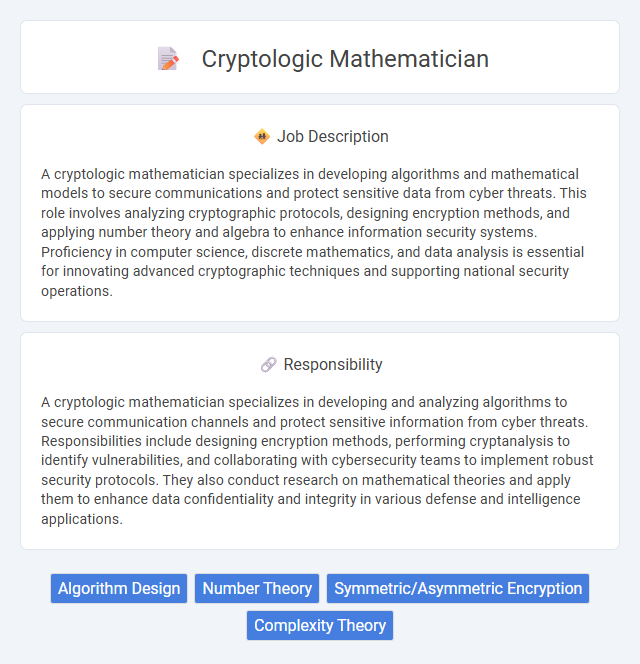
A cryptologic mathematician specializes in developing algorithms and mathematical models to secure communications and protect sensitive data from cyber threats. This role involves analyzing cryptographic protocols, designing encryption methods, and applying number theory and algebra to enhance information security systems. Proficiency in computer science, discrete mathematics, and data analysis is essential for innovating advanced cryptographic techniques and supporting national security operations.
Individuals with strong analytical skills and a passion for mathematics are likely to find the role of a cryptologic mathematician suitable, as it demands precision and problem-solving abilities. People who enjoy working independently and have an interest in security and encryption may be well-suited for the challenges presented by this job. Those who struggle with abstract concepts or lack attention to detail might face difficulties adapting to the requirements of this specialized field.
Qualification
A Cryptologic Mathematician typically requires a bachelor's degree in mathematics, computer science, or a related field, with many positions preferring advanced degrees such as a master's or Ph.D. Strong analytical skills, proficiency in algorithms, number theory, and cryptographic techniques are essential. Experience with programming languages like Python, C++, and expertise in data security protocols enhances job prospects in cryptologic research and intelligence analysis.
Responsibility
A cryptologic mathematician specializes in developing and analyzing algorithms to secure communication channels and protect sensitive information from cyber threats. Responsibilities include designing encryption methods, performing cryptanalysis to identify vulnerabilities, and collaborating with cybersecurity teams to implement robust security protocols. They also conduct research on mathematical theories and apply them to enhance data confidentiality and integrity in various defense and intelligence applications.
Benefit
Cryptologic mathematicians likely benefit from high job security due to the critical need for secure communication in intelligence and defense sectors. Their specialized skills might command competitive salaries and opportunities for career advancement within government agencies. The work environment probably offers intellectual challenges and the chance to contribute to national security through cutting-edge cryptographic research.
Challenge
Cryptologic mathematician roles likely involve complex problem-solving challenges requiring advanced knowledge of mathematics and computer science. The position probably demands continuous adaptation to evolving encryption techniques and cyber threats, which can make the work intellectually stimulating but highly demanding. Candidates may often face intricate data analysis tasks and theoretical modeling to secure communications and decode encrypted information.
Career Advancement
Cryptologic mathematicians specialize in developing algorithms and cryptographic techniques to secure sensitive information for government and private sectors. Career advancement often involves gaining expertise in advanced encryption methods, network security, and quantum computing to tackle evolving cyber threats. Progression to senior roles or management positions typically requires continuous professional development, certifications in cybersecurity, and experience in multidisciplinary teams.
Key Terms
Algorithm Design
Cryptologic mathematicians specialize in algorithm design to develop secure encryption methods and cryptographic protocols that protect sensitive information from cyber threats. They analyze complex mathematical structures and apply number theory, combinatorics, and computational complexity to create efficient, robust cryptographic algorithms. Proficiency in programming languages like Python and C++ supports the implementation and testing of these algorithms in real-world security systems.
Number Theory
Cryptologic mathematicians specializing in number theory apply deep knowledge of prime numbers, modular arithmetic, and algebraic structures to design and analyze robust encryption algorithms. Their expertise supports the development of cryptographic protocols essential for secure communication in military, government, and financial sectors. Advanced skills in algorithmic complexity and computational number theory enable them to solve problems related to integer factorization and discrete logarithms, which underpin modern cryptographic security.
Symmetric/Asymmetric Encryption
Cryptologic mathematicians specialize in developing and analyzing cryptographic algorithms, focusing extensively on symmetric and asymmetric encryption techniques to secure digital communications. They design robust encryption methods, such as AES (Advanced Encryption Standard) for symmetric encryption and RSA or ECC (Elliptic Curve Cryptography) for asymmetric encryption, ensuring data confidentiality and integrity. Their expertise is critical in safeguarding sensitive information across military, governmental, and commercial systems against evolving cyber threats.
Complexity Theory
Cryptologic mathematicians specializing in Complexity Theory analyze algorithmic efficiency and computational hardness to design secure encryption systems. Their expertise involves classifying problems by computational difficulty, enhancing cryptographic protocols resistant to attacks from efficient algorithms or quantum computing advancements. Mastery of complexity classes such as P, NP, and NP-complete is essential for developing robust cryptosystems that protect sensitive data in cybersecurity applications.
 kuljobs.com
kuljobs.com